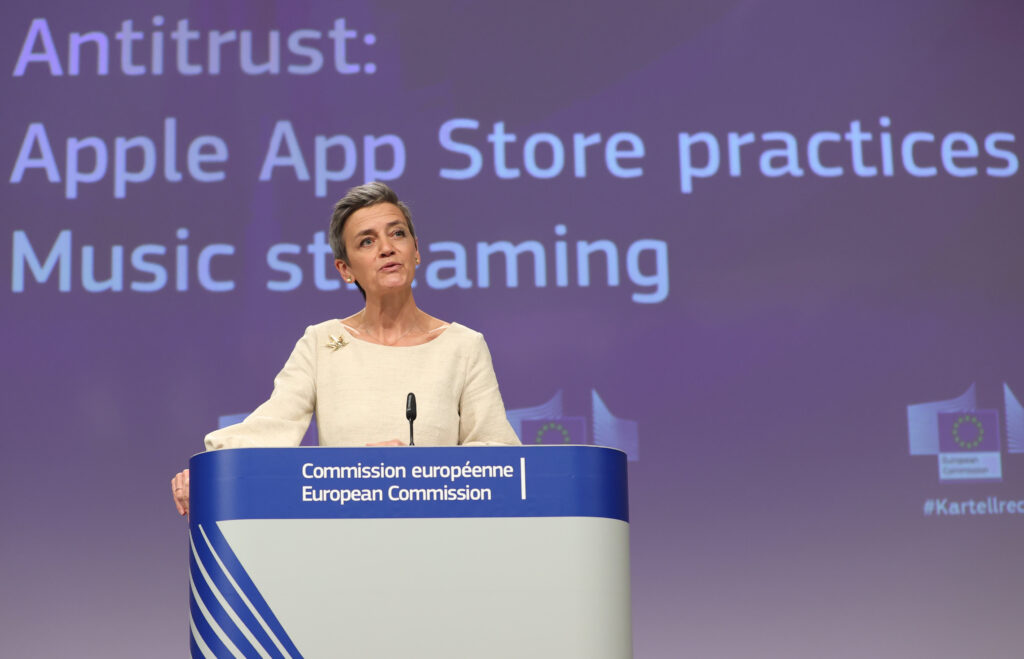Margrethe Vestager, Executive Vice-President of the European Commission (Competition) for a Europe Fit for the Digital Age, holds a press conference on “Apple on App Store Rules for Music Streaming Providers” in Brussels, Belgium, on April 30, 2021. held. Photo by Dursun Aydemir/Anadolu Agency, Getty Images)
Dursun Aydemir | Anadolu | Getty Images
The European Union launched an investigation into Apple, Alphabet and Meta on Monday, the first of its kind under a sweeping new digital markets law.
“Today, the European Commission launched a non-compliance investigation under the Digital Markets Act (DMA) regarding Alphabet’s rules regarding Google Play operations and self-prioritization in Google Search, as well as its App Store operations and Safari selection screen. Apple's rules and Meta's 'pay or consent model',” the European Commission said in a statement.
The first two studies focus on Alphabet and Apple and relate to so-called “anti-steering rules.” Under the DMA, tech companies cannot prevent companies from telling users about cheaper options for their products or subscriptions outside of the app store.
“The way Apple and Alphabet have implemented the DMA rules on anti-steering appears to be inconsistent with the letter of the law. Apple and Alphabet will continue to charge various recurring fees and limit steering,” the EU said. Margrethe Vestager, head of competition, said at a press conference. Monday's press conference.
Apple is already violating EU rules in this regard. This month, the European Commission announced that Apple had imposed restrictions on app developers that prevented them from informing iOS users about alternative, cheaper music subscription services available outside of their apps. was fined 1.8 billion euros ($1.95 billion).
The third study focuses on the alphabet. The European Commission will investigate whether Alphabet's display of Google search results “could lead to self-prioritization in relation to Google” of other services, such as Google Shopping, over similar competing services. He said that
The fourth study focuses on Apple. The commission investigated whether the company complied with its obligations under the DMA to ensure that users can easily uninstall apps on iOS and easily change iOS default settings. He said there was. The investigation also focuses on whether Apple actively presents users with options to change default services in iOS, such as his web browser and search engine.
The committee said it is “concerned that Apple's actions, including the design of its web browser selection screen, may prevent users from actually selecting services within Apple's ecosystem.” .
The fifth and final study focuses on Meta and its so-called “pay and consent” model. Last year, Meta introduced an ad-free subscription model on Facebook and Instagram in Europe. The commission is investigating whether offering an ad-free subscription model or requiring users to agree to terms of use for free services violates the DMA.
“The European Commission has found that the binary choice imposed by Meta’s ‘pay or consent’ model may not provide users with a real choice if they do not consent, thereby preventing gatekeepers from accessing personal data. We are concerned that we will not be able to achieve our objective of preventing accumulation.”
Thierry Breton, the EU's internal market commissioner, told a press conference that there should be a “free alternative option” offered by Meta for “less personalized” services.
Gatekeeper is a term used in the EU to describe large technology companies that must comply with the DMA.
“We will continue to use all tools available to us in cases where gatekeepers attempt to evade or violate the DMA's obligations,” Vestager said.
The European Commission has said it intends to conclude the investigation within 12 months, but Vestager and Breton stressed in Monday's press conference that the DMA does not dictate a hard deadline for the investigation's timeline. The regulator will notify the company of its preliminary findings and explain the steps it is taking, or the gatekeeper should take, to address the commission's concerns.
If a company is found to have violated the DMA, the European Commission can impose fines of up to 10% of the tech company's global turnover. In case of repeated violations, these fines can increase to 20%.
The commission also said it is seeking facts and information to determine whether Amazon may be prioritizing private label products over competitors on its e-commerce platform. The committee is further investigating Apple's new pricing structure and other terms and conditions for alternative app stores.
This month, the tech giant announced that users in the EU will be able to download apps from its website rather than through its own App Store. This is a change that Apple has resisted for years.
The EU investigation into Apple and Amazon is not an official investigation.
CNBC has reached out to Apple, Alphabet, and Meta for comment.


